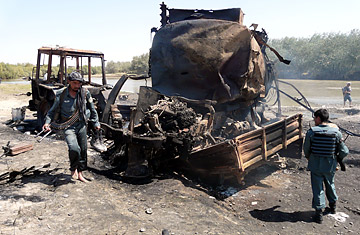
Afghan police inspect the site of an airstrike on fuel tankers in Kunduz.
It was a great scoop. "Did Minister Jung conceal the truth?" Germany's mass-circulation tabloid Bild demanded to know Thursday in a story focused on the country's employment minister Franz Josef Jung and what details he knew and when, in his former job as defense minister, about the controversial air strike, called in by German forces, on two hijacked tanker trucks in northern Afghanistan on Sept. 4.
The strikes, by two U.S. fighter jets, killed some 142 Afghans near the northern city of Kunduz and continue to reverberate in Berlin. Called in by Colonel Georg Klein, then ISAF commander of the German-run Provincial Reconstruction Team (PRT) base in Kunduz, the operation was a rare moment of combat for Germany's armed forces, which mostly concentrate on rebuilding projects rather than chasing down Taliban fighters. Jung, who switched office last month following Germany's elections, initially claimed that only "Taliban terrorists" had been killed. But on Sept. 7 he conceded that there may have been some civilian casualties. (The number of civilians killed is now estimated to be up to 40.) According to Bild, however, the Bundeswehr (as Germany's Federal Defense Force is called) leadership and the ministry had known of civilian victims early on. Those reports were withheld from prosecutors, and also, apparently, from Jung's successor as defense minister, Karl-Theodor zu Guttenberg.
Bild's story quoted from reports by German military personnel on the ground, reports which reached the command center in Potsdam, near Berlin, and the ministry within hours of the attack. On its website the paper also posted a video of the strike. Even to the untrained eye, the many ant-like dots swarming around the trucks, which had become stuck in sand, suggested that those present at the scene were unlikely to all be insurgent fighters. A suggestion by the U.S. pilots to send a warning to those who had commandeered the trucks by flying low across the scene was not taken up, Bild said in its commentary to the video. That revelation adds weight to criticism of the attack made at the time by the commander of American and international forces (ISAF) in Afghanistan, General Stanley McChrystal, who had previously stressed the paramount aim of avoiding civilian casualties in Afghanistan.
The impact of Bild's revelations came swiftly. Addressing Germany's parliament, which was about to begin debating a one-year extension of Germany's deployment of around 4,300 troops, zu Guttenberg told deputies that Wolfgang Schneiderhan, Inspector-General and head of Germany's armed forces since 2002, and long-serving state secretary Peter Wichert, a senior official at Germany's defense department, had taken responsibility for the breakdown in communications and resigned. Jung initially defended his actions but resigned Friday.
The revelations come at a critical time. President Obama is due to reveal his new Afghanistan strategy in the next few days. If, as suspected, the U.S. deploys additional troops it's also likely to repeat calls for its allies to do likewise. But in Germany, where the Afghanistan mission is deeply unpopular, this incident and the alleged cover-up have raised fresh doubts about whether Germany should be there at all. Reflecting the mood, zu Guttenberg urged parliament to start "thinking the Afghanistan mission from its end," making the case for better-defined goals and an exit strategy. "There is a need for more clarity on how, and under which circumstances, the mission can end," he told the Bundestag.
The uproar in parliament and in the media overshadowed a visit to Berlin by the General Secretary of NATO, Anders Fogh Rasmussen, who was in town to make the case for increased efforts by European allies in Afghanistan. Chancellor Angela Merkel, at a press conference with Rasmussen, criticized the handling of the affair, saying: "If we want trust, we also have to have full transparency." Rasmussen pleaded that it was of the "utmost importance that an American announcement of an increased troop number in Afghanistan is followed by additional troop contributions from other allies." But that's likely to fall on deaf ears for now. The draft bill to extend Germany's deployment includes a provision to keep troops at their present level of no more than 4500 — the third largest contingent after the United States and Britain — but does not allow for increased numbers.
With headlines crying "lies" and the defense ministry badly damaged, many expect the affair to reinforce German opposition to the Afghanistan deployment, which is the most substantial deployment since the end of World War II, and is taking on the character of a fighting mission. Some see the affair as a chance for Germany's government, and the Western alliance more broadly, to have a real debate about strategic goals in the Hindu Kush. "Zu Guttenberg is likely to emerge strengthened from this", Volker Perthes, the head of the German Institute for International and Security Affairs, told TIME. "He is talking straight, which is appreciated by the German public."
